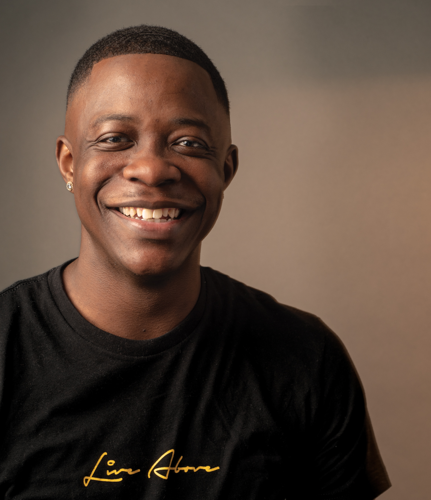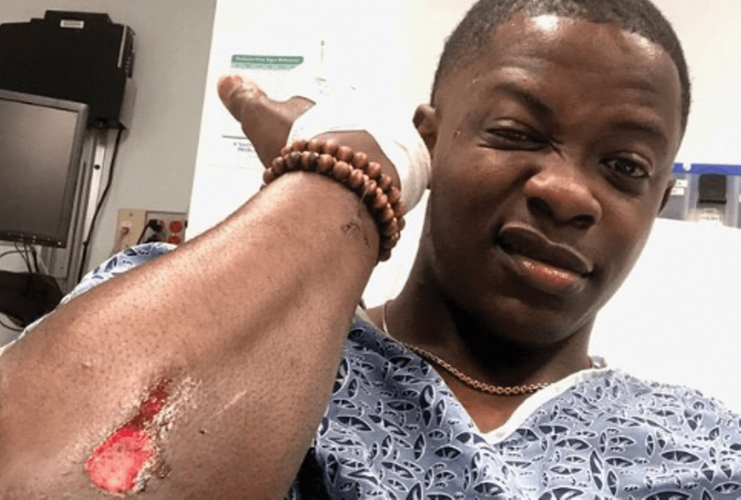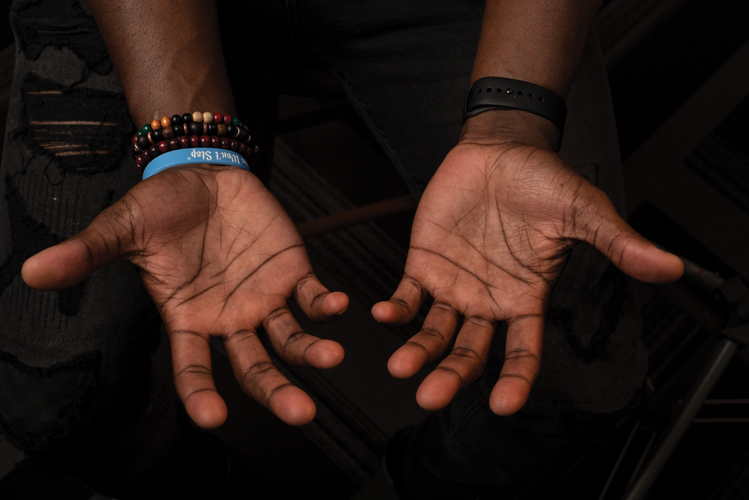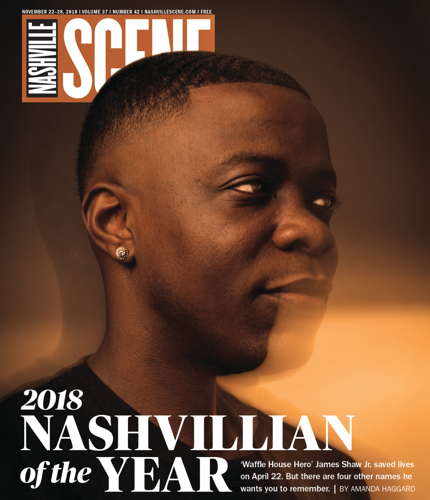
Taurean C. Sanderlin. Joe R. Perez. DeEbony Groves. Akilah DaSilva.
These are the names James Shaw Jr. wants everyone to remember.
Shaw, the 29-year-old electrician who gained national attention after charging and disarming a gunman at an Antioch Waffle House this spring, made it out of that deadly situation with minor injuries. Sanderlin, Perez, Groves and DaSilva, however, never made it home at all that early morning in April. Sanderlin, 29, was an employee at the Waffle House. Perez, 20, was originally from Texas and was in town working for a surveying company. Groves, 21, was a Belmont University student majoring in social work. DaSilva, 23, was a local rap artist who went by the name Natrix Dream.
Two others, Shantia Waggoner and Sharita Henderson, are still healing from the wounds they sustained during the attack. Still others were injured by the glass that broke as the gunman shot the windows out. All of the victims of the shooting were in their 20s.
“You don’t want to have the spotlight for being a survivor when four people died,” Shaw tells the Scene. “That’s not really what you want to have a spotlight for. I wish it was different. I know it’s rough to make it about people that died and not about me, but you have to know that this situation isn’t, like, ideal. I never wanted this.”
During the early-morning hours of April 22, the Waffle House in Antioch was full of patrons. In the parking lot, a gunman exited his truck wearing nothing but a green jacket and fired an AR-15 toward the windows of the restaurant. Shaw locked eyes with the shooter as the man walked into the restaurant.
This particular Waffle House wasn’t as full as the one on Bell Road was at the time, Shaw says. He knows because he and his friend B.J. McMurry went there first, but it was too packed. He thought about that as he stood in the hallway next to the bathroom, waiting for the right time to rush the gunman. A bullet had already grazed Shaw’s elbow as he made his way back to the hallway.
About 10 people had crowded into the restaurant’s two bathrooms, and there were still several people in the dining area. Shaw’s friend McMurry told the people hiding in the bathrooms that if the shooter came into the hallway, they would have to fight back — they’d have to try and take his weapon. McMurry had been trained in active-shooter situations for his job. He told the people hiding to be quiet, to keep calm, to not draw any attention to where they were.
Shaw listened and thought of a mantra he learned from his father: “Be smarter than the thing you’re working on.”
So he waited. And when the gunman stopped shooting — maybe his gun jammed, or maybe he needed to reload — Shaw was watching through the small window of the hallway door. He saw his opportunity. He charged the shooter, grabbing the barrel of the gun and pointing it toward the ground. He managed to wrestle the weapon from the man, tossing it away over the counter. Shaw’s hand was badly burned from gripping the barrel of the AR-15, which was hot from all the rounds it had discharged. But he managed to force the shooter out of the restaurant.
“After I got him outside, I realized that I didn’t have my phone,” Shaw says. He asked a rideshare driver and another person in a Nissan Maxima to call the police.
“By this time my arm was bleeding, and I think I was bleeding from my head — I had a scratch on my head — and they saw,” Shaw says. “I guess they could see it in my eyes that I wasn’t playing, like there was just a shooting. They both called the police, and they finally came.”
Overnight, Shaw became known for his heroic actions in that Waffle House — though he adamantly denied being a hero after the incident, saying his actions were motivated purely by self-preservation. But he also says that if you’d asked him before the incident if he would have reacted the way he did, he would have known the way he’d respond.
“I don’t see myself giving up,” Shaw says. “I’ve never been the type to give up. I’ve always been a fighter. When something looks bleak, or it doesn’t look like it could happen, I’m that type of person that has that optimism.”

Shaw shows his injuries shortly after the shooting.
As Shaw’s influence and hero status have grown over the past few months, his circle of friends has grown tighter.
“I went from being kind of a nobody to getting national public recognition, so I kind of want to protect myself and protect my family,” Shaw says. “I don’t really try to make a lot of new friends or anything like that.”
But that might be easier said than done. Shaw can’t go anywhere in Nashville without being recognized. When the Scene meets with him at a restaurant in the Gulch, no fewer than four patrons ask for a photo with “the Waffle House Hero.” The owner gives Shaw his meal without charge, and several others thank him for his actions. He was even stopped and recognized multiple times on a recent trip to New York City. Shaw is a conventionally handsome guy, tall and slender with an athletic build and a penchant for dressing sharply. He has a warm smile, and women are clearly drawn to him. He’s quiet and somewhat unassuming — kind enough to take selfies with people, but noticeably somewhat uncomfortable with it.
He also won’t sit with his back to the door while he eats, and he says restaurants make him nervous.
“I still haven’t been back into a Waffle House,” Shaw says. “I’ll get there, but it’s baby steps for me right now. I went to the parking lot on the six-month anniversary of the shooting, but that’s about as far as I’m comfortable going right now. There are plenty of other places to get breakfast.”
In the months since the shooting, Shaw has been honored several times. He received BET’s Humanitarian Hero award. Black Panther’s Chadwick Boseman gave his MTV Movie Award for Best Hero to Shaw. He received an honorary degree and recognition from Tennessee State University, and the Tennessee state legislature passed a joint resolution honoring him. He was on People’s list of the 100 most influential people of the year, and he was given a Gold Vail Award by his employer, AT&T. Mayor David Briley was one of the first to reach out to Shaw in the hours after the shooting — Shaw says he was shocked at how much Briley already knew about him. He has been on The Ellen DeGeneres Show, Steve Harvey and The Van Jones Show to offer his perspective and talk about his experience.
Shaw raised a quarter-of-a-million dollars via a GoFundMe campaign for the victims and families of victims of the shooting. He’s interested in continuing his activism around gun control. And more recently, he announced he’ll campaign for Nashville’s mayoral seat in 2019. Some have questioned whether he’s ready for political office — whether he, for instance, can handle the city’s $2 billion budget. Shaw says his main motivation is the young people of color who approach him to tell him they consider him a role model. He says he’s tired of watching money go to real estate development and not to schools, and that public figures too often forget that they’re serving people.
“There’s a disconnect, and I think that’s the problem,” Shaw says. “The first thing politicians and pundits think about is money. The first thing I think about is people. I think that’s why someone like me is needed for an office like that. I’m still just in early stages of thinking about it and considering what it might mean for me.”
Before the shooting, Shaw — who grew up in Nashville and went to Hunters Lane High School — was working as an electrician for AT&T. He didn’t think much about gun control or politics in general before the incident. If it didn’t affect him personally, he says, he figured he had no business having an opinion on it. But Shaw now sees that as a selfish mindset. Shaw clearly has a sort of everyman appeal — he’s more of a Spider-Man type than a Superman, you could say — and people seem to want to listen to him.
“I know you’re not going to get rid of all the guns that all these people have,” Shaw says. “That’s not my goal, to get rid of all of those. I think that most people’s goal is to not get rid of all the guns, but to make people accountable for those guns.”
Guns belonging to the alleged shooter, Travis Reinking, had been taken away by police in Illinois in 2017 after he threatened people with them. Authorities gave the guns to his father, Jeff Reinking, for safekeeping. But his father gave them back, and the 29-year-old moved to the Nashville area. Ultimately, one of the guns was allegedly used in the shooting. Initially, Davidson County Criminal Court Judge Mark Fishburn ruled that Travis Reinking was not fit for trial. So Reinking was ordered in August to receive treatment at a mental hospital for schizophrenia. But at the end of October, he was deemed competent by the Middle Tennessee Mental Health Institute to stand trial for the shooting.That allowed the criminal case against him to move forward. Currently, a grand jury is looking at evidence and determining which charges he will face. He’s being represented by the Metro Public Defender’s Office.
Shaw says he blames Reinking’s father more for the shooting than he blames the alleged shooter himself. Jeff Reinking is a gun owner himself, and Shaw says he should’ve been more responsible.
“The situation we were put in — we as in the four people that were killed, the two ladies that were shot, and everybody else that was in the situation, but mainly the people who were killed — is one that nobody should ever have to be in,” Shaw says. “His father gave the guns back knowing that he wasn’t supposed to, and I feel like he might as well have been in the truck that night and handed him the gun.”
But Shaw says Jeff Reinking’s real failing was as a father. A father, he says, is meant to be an enforcer and protector. A father, he says, should have done what was best for his child and kept the guns away from him. Shaw says he’s always felt support and love from his mother and father, and counts himself lucky to be able to say that.
“It’s really sad,” he says. “I feel like his father failed him, and his father ostracized him and pushed him away from the family, and then he ended up here in Nashville. In my mind, he didn’t give him the love and attention he needed.”
Shaw says he tries to comment less on the Reinking family and more on the four young people who died, as well as their families. Shaw says he’ll live with the memories of that morning forever — he has scars on his body as a physical reminder, burns on his hands and a small bullet fragment lodged in his arm. But the families of those who died have empty spaces in their lives that can never be filled.
“I hope the families and the survivors, I hope they’re real proud of what I’ve done in just trying to keep their legacies in this situation alive,” Shaw says. “You know, four people died and aren’t ever going back to their families.”
He learned that Groves’ father was fishing when he got the call that his daughter had been killed in the shooting. Shaw says he thinks about that often, about how that must feel as a parent.
“The reason, I think, DeEbony effects me more is because I have a little girl, and I can picture [my daughter] Brooklyn being DeEbony,” Shaw says of his 4-year-old. “I wouldn’t want to lose my little girl, so that’s why I try to go so hard for them, because they can’t tell their story anymore.”

Shaw relives the events of April 22 often, thinking about what he might have done differently, worrying that he didn’t save enough people. He says he’s in therapy to work through the trauma of the incident, and that the images from that morning still haunt him.
One memory in particular has stuck with him: A woman had been shot — he says “her leg was hanging off, kind of like a banana peel after you peel the skin.” Shaw says she kept asking him to help, and he had to look at her and tell her there was nothing he could do.
“That’s when, you know, I felt kind of useless,” Shaw says. “It still bothers me, but I’m happy that she pulled through, and that she’s in physical therapy and about to start walking again. There’s just a lot of stuff that bothers me that people don’t know. Survivor’s guilt is what I’m told it is. But I feel guilty, like I should’ve also been able to keep that from happening to her.”
If it weren’t for Shaw, the events of April 22 could have been even deadlier. But the incident reminds us that mass shootings have happened in nearly every familiar locale we see in daily American life: schools, churches, offices, concerts, restaurants. Another name was added to the list of deranged white men using a gun to devastate the lives of a huge network of people — in doing so adding names to an ever-growing list of people affected by mass shootings, and of people lost to gun violence.
But there was something different about the Waffle House shooting — a young man who was added to a much shorter list. A man who waited for the right moment, who did something heroic that no one should ever have to do. A man who’s still not quite comfortable with the spotlight, as much as he deserves it.
James Shaw Jr. is our Nashvillian of the Year, and he wants you to remember these four names: Taurean C. Sanderlin, Joe R. Perez, DeEbony Groves and Akilah DaSilva.









